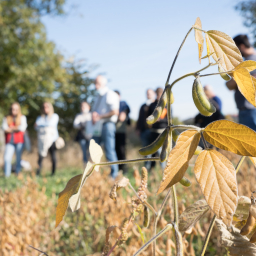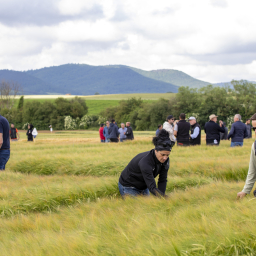NEW
Organic flour: from ‘farm to table’
31 March 2023- NEIKER and the rural development association ADR Lautada held yesterday a conference focused on the baking quality of organic cereal cultivation in the Llanada Alavesa
- This event is part of the Lanirina project, to cover the entire value chain of organic cereal cultivation in this territory, from producers to final consumers
- Specifically, it will generate high-value organic flour and develop products made from this raw material such as bread, pastries or healthier pizza doughs
The gradual incorporation of organic crops and the reduction of the use of phytosanitary products are some of the measures that contribute to improve soil quality, ensuring its fertility and sustainability.
In addition, more and more consumers are demanding healthier foods that meet their needs without compromising those of future generations. This requires an effort on the part of the agricultural sector to make the transition to organic crops that meet these expectations.
To advance the transition of the primary sector towards the implementation of organic crops, the technology center NEIKER, member of the Basque Research and Technology Alliance (BRTA), participates in the Lanirina project, led by the Rural Development Association (ADR) Lautada. The objective? To connect all the links in the value chain of organic cereal cultivation in the Llanada Alavesa: from producers to consumers, without the need for intermediaries.
Specifically, the initiative is focused on transforming this raw material into value-added organic flour, of higher quality, to offer it directly to end consumers in flour format or in organic products made from flour such as bread, pastries or pizzas. In this way, a double objective is achieved: preserving the health of the land and promoting the generation of links between producers and final buyers due to the lack of intermediaries.
Training in organic farming
As part of this initiative, NEIKER and ADR Lautada organized yesterday at the headquarters of the technology center in Arkaute (Alava), a day of discussion focused on the baking quality of organic cereal in the Llanada Alavesa.
The event was a meeting between people responsible for this value chain as, for example, bakers, among other professionals in the bakery sector and served to know their contributions in each link, as well as to appreciate the quality of wheat and promote their cultivation.
Within Lanirina, different tasks are carried out, ranging from field work to final consumption. In this way, among other actions, advice and training is offered to agricultural professionals to guide them on the path towards the transition to organic crops. These training actions are also indicated for the staff responsible for cleaning and milling of wheat to be able to give greater value to the cereal.
Also, small businesses, craft workshops and end consumers also have a great weight in the initiative. Their evaluations and opinions serve to measure the degree of acceptance of the product and create new market opportunities.
“With the implementation of this new value chain for organic cereal from the Llanada Alavesa, we seek to generate a new business model in which farmers collaborate with other links in the processing of the material, also promoting new economic activities in the region,” explains Arantza Arrien, Rural Development Technician of ADR Lautada.
Within the project, the technology center is responsible for transferring its knowledge on the selection of cereal varieties that offer better performance in organic farming, to propose guidelines to ensure the quality of cereals or to explain the most appropriate management for this type of cereals.
“Often, bakery professionals are surprised to learn about the qualities of organic cereals. When they receive training on their characteristics and possibilities, they are open to incorporate this type of products to their offer. This causes them to demand more organic flours and other agents in the value chain, such as farmers, decide to diversify their crops by incorporating this type of cereals,” adds Roberto Ruiz de Arcaute, a researcher at the Department of Plant Production and Protection of NEIKER who takes part in this project.
Towards the development of the agriculture of the future
With these actions, the initiative aims to address the main challenges of the primary sector and the rural environment in the Basque Country so that a transformation can be carried out to achieve a more modern agriculture with a future.
In this way, the participants of the Lanirina project assume the responsibility of preserving the natural landscape through the cultivation of organic cereals, which transfers beneficial properties to the land, preserving its fertility and generating new opportunities for activities linked to this value chain.
In this line, the initiative aims to raise awareness among farmers of the new needs of both the environment and consumers, and encourages them to participate in the cultivation of organic cereals. At the same time, it promotes organic products made from the flour generated with the validation of bakeries and end consumers.
Lanirina supports the agricultural sector to make a transition to organic farming and joins the Plan for the Promotion of Organic Production (FOPE) promoted by the Department of Economic Development, Sustainability and Environment of the Basque Government since 2014 to increase organic production and develop the associated processing and marketing chain.
Yesterday’s event responds at the same time to the need of the sector to adapt to the strategy ‘From farm to fork’ of the European Union. The aim is to promote organic farming as an environmentally friendly practice and seeks that 25% of EU agricultural land is devoted to this type of cultivation in 2030.





